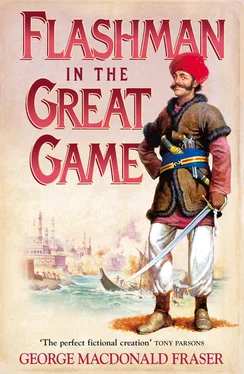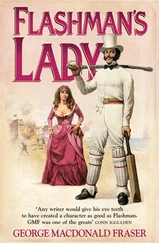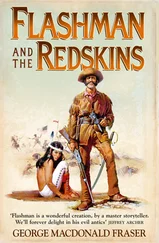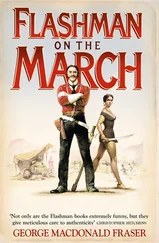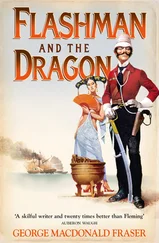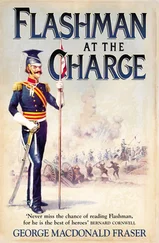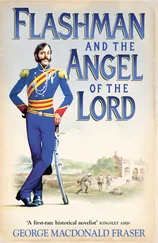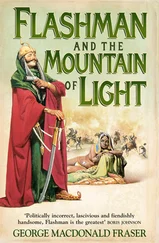‘You did, did you?’ says I. ‘Does every Briton in Jhansi leap to attention when this beldam snaps her fingers, then?’
‘Shall we say, we find it convenient to humour her highness,’ says he – he was more of a political than he looked, this lad, so I blustered a bit, to be in character, and then said he might find me an escort of lancers to convoy me in.
‘I’m sorry, sir,’ says he. ‘We haven’t any lancers – and if we had, we’ve agreed not to send troop formations inside the city walls. Also, since I was excluded from the, er … invitation, I fear you must go alone.’
‘What?’ says I. ‘Damnation, who governs here – the Sirkar or this harridan?’ I didn’t fancy above half risking my hide unguarded in that unhealthy-looking fortress, but I had to cover it with dignity. ‘You’ve made a rod for your own backs by being too soft with this … this woman. She’s not Queen Bess, you know!’
‘She thinks she is,’ says he cheerfully, so in the end of course I had to lump it. But I changed into my lancer fig first, sabre, revolver and all – for I could guess why she was ensuring that I visited her alone: up-country, on the frontier, they judge a man on his own looks, but down here they go on the amount and richness of your retinue. One mounted officer wasn’t going to impress the natives with the Sirkar’s power – well, then, he’d look his best, and be damned to her. So I figged up, and when I regarded myself in Skene’s cracked mirror – blue tunic and breeches, gold belt and epaulettes, white gauntlets and helmet, well-bristled whiskers, and Flashy’s stalwart fourteen stone inside it all, it wasn’t half bad. I took a couple of packages from my trunk, stowed them in my saddlebag, waved to Skene, and trotted off to meet royalty, with only the syce to show me the way.
Jhansi city lies about a couple of miles from the cantonment, and I had plenty of time to take in the scenery. The road, which was well-lined with temples and smaller buildings, was crowded into the city, with bullock-carts churning up the dust, camels, palankeens, and hordes of travellers both mounted and on foot. Most of them were country folk, on their way to the bazaars, but every now and then would come an elephant with red and gold fringed howdah swaying along, carrying some minor nabob or rich lady, or a portly merchant on his mule with a string of porters behind, and once the syce pointed out a group who he said were members of the Rani’s own bodyguard – a dozen stalwart Khyberie Pathans, of all things, trotting along very military in double file, with mail coats and red silk scarves wound round their spiked helmets. The Rani might not have a army, but she wasn’t short of force, with those fellows about: there was a hundred years’ Company service among them if there was a day.
And her city defences were a sight to see – massive walls twenty feet high, and beyond them a warren of streets stretching for near a mile to the castle rock, with its series of curtain walls and round towers – it would be the deuce of a place to storm, after you’d fought through the city itself; there were guns in the embrasures, and mail-clad spearmen on the walls, all looking like business.
We had to force our horses through a crowded inferno of heat and smells and noise and jostling niggers to get to the palace, which stood apart from the fort near a small lake, with a shady park about it; it was a fine, four-square building, its outer walls beautifully decorated with huge paintings of battles and hunting scenes. I presented myself to another Pathan, very splendid in steel back-and-breast and long-tail puggaree , who commanded the gate guard, and sat sweating in the scorching sun while he sent off a messenger for the chamberlain. And as I chafed impatiently, the Pathan walked slowly round me, eyeing me up and down, and presently stopped, stuck his thumbs in his belt, and spat carefully on my shadow.
Now, close by the gate there happened to be a number of booths and side-shows set up – the usual things, lemonade-sellers, a fakir with a plant growing through his palm, sundry beggars, and a kind of punch-and-judy show, which was being watched by a group of ladies in a palankeen. As a matter of fact, they’d already taken my eye, for they were obviously Maharatta females of quality, and four finer little trotters you never saw. There was a very slim, languid-looking beauty in a gold sari reclining in the palankeen, another plump piece in scarlet trousers and jacket beside her, and a third, very black, but fine-boned as a Swede, with a pearl headdress that must have cost my year’s pay, sitting in a kind of camp-chair alongside – even the ladies’ maid standing beside the palankeen was a looker, with great almond eyes and a figure inside her plain white sari like a Hindoo temple goddess. I was in the act of touching my hat to them when the Pathan started expectorating. At this the maid giggled, the ladies looked, and the Pathan sniffed contemptuously and spat again.
Well, as a rule anyone can insult me and see how much it pays him, especially if he’s large and ugly and carrying a tulwar . fn3But for the credit of the Sirkar, and my own face in front of the women, I had to do something, so I looked the Pathan up and down, glanced away, and said quietly in Pushtu:
‘You would spit more carefully if you were still in the Guides, hubshi .’ fn4
He opened his eyes at that, and swore. ‘Who calls me hubshi ? Who says I was in the Guides? And what is it to thee, feringhee fn5pig?’
‘You wear the old coat under your breastplate,’ says I. ‘But belike you stole it from a dead Guide. For no man who had a right to that uniform would spit on Bloody Lance’s shadow.’
That set him back on his heels. ‘Bloody Lance?’ says he. ‘Thou?’ He came closer and stared up at me. ‘Art thou that same Iflass-man who slew the four Gilzais?’
‘At Mogala,’ says I mildly. It had caused a great stir at the time, in the Gilzai country, and won me considerable fame (and my extravagant nickname) along the Kabul road – in fact, old Mohammed Iqbal had killed the four horsemen, while I lit out for the undergrowth, but nobody living knew that. fn6And obviously the legend endured, for the Pathan gaped and swore again, and then came hastily to attention and threw me a barra salaam fn7that would have passed at Horse Guards.
‘Sher Khan, havildar fn8lately of Ismeet Sahib’s company of the Guides, 7as your honour says,’ croaks he. ‘Now, shame on me and mine that I put dishonour on Bloody Lance, and knew him not! Think not ill of me, husoor , fn9for—’
‘Let the ill think ill,’ says I easily. ‘The spittle of a durwan fn10will not drown a soldier.’ I was watching out of the corner of my eye to see how the ladies were taking this, and noted with satisfaction that they were giggling at the Pathan’s discomfiture. ‘Boast to your children, O Ghazi fn11-that-was-a-Guide-and-is-now-a-Rani’s-porter, that you spat on Bloody Lance Iflass-man’s shadow – and lived.’ And I walked my horse past him into the courtyard, well pleased; it would be all round Jhansi inside the hour.
It was a trifling enough incident, and I forgot it with my first glance at the interior of the Rani’s palace. Outside it had been all dust and heat and din, but here was the finest garden courtyard you ever saw – a cool, pleasant enclosure where little antelopes and peacocks strutted on the lawns, parrots and monkeys chattered softly in the surrounding trees, and a dazzling white fountain played; there were shaded archways in the carved walls, where well-dressed folk whom I took to be her courtiers sat and talked, waited on by bearers. One of the richest thrones in India, Pam had said, and I could believe it – there were enough silks and jewellery on view there to stuff an army with loot, the statuary was of the finest, in marble and coloured stones that I took to be jade, and even the pigeons that pecked at the spotless pavements had silver rings on their claws. Until you’ve seen it, of course, you can’t imagine the luxury in which these Indian princes keep themselves – and there are folk at home who’ll tell you that John Company were the robbers!
Читать дальше
